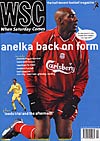 David Montrose remembers West Ham United's 1985-86 season
David Montrose remembers West Ham United's 1985-86 season
August, 1985: the omens were ominous. West Ham had ended the previous season just clear of relegation, and Paul Allen, Hammer of the Year, had since decamped to Spurs under freedom of contract – a trenchant vote of no-confidence. Few thought jockey-sized Mark Ward, ex-Oldham, would prove an adequate successor. The acquisition of St Mirren’s Frank McAvennie, meanwhile, aroused more mystification than anticipation. Who? Even his position was uncertain. Striker, midfielder?
The season opened with a whimper, a 1-0 defeat at Birmingham. McAvennie was deployed behind Tony Cottee and Paul Goddard in a 4-3-1-2 formation. This wheeze collapsed before half-time when Goddard suffered a long-term shoulder injury. McAvennie moved alongside Cottee and Alan Dickens came on to create a conventional 4-4-2. Which was pretty much how it stayed for the next 42 games.
Things looked up – QPR beaten 3-1, McAvennie scoring twice – only to look straight down again, with defeats at home to Luton (1-0) and at Old Trafford (2-0). Three draws followed, lifting us to 17th. McAvennie had already scored six.
Almost inexplicably, those draws grew into an 18-match unbeaten run, ended by our traditional Boxing Day defeat, this time at Spurs. By then, we stood joint second, four points behind Man Utd. McAvennie had 18 goals (plus two Scotland caps) and Cottee ten. Alvin Martin and Tony Gale, in their second season together, had established a sound partnership. Goalkeeper Phil Parkes was approaching his form of the 1980-81 promotion season. In midfield, Alan Devonshire, back from a long-term injury, looked his old self while Ward – Steve Coppell with a mean streak – had made me forget that Allen bloke.
Another factor was a settled team. Spared the usual injury crisis, manager John Lyall relied largely on 12 players, nine making 38 appearances or more (a blessing, given the lack of reserve strength). The basic line-up underwent only one change, George Parris replacing Steve Walford at left-back halfway through the season.
After Christmas came a prolonged freeze. The team coped reasonably well with intermittent fixtures, though a reverse came acrimoniously at Anfield. Ray Stewart was dismissed for excessive indignation when, at 0-0, a penalty was awarded after a home forward suffered a giddy spell. As it turned out, a win then instead of a 3-1 defeat would have ultimately earned us the title. But there are always ifs and maybes.
Six weeks of weather-induced inactivity from early February improved our position. Other teams dropped points, we accumulated games in hand. By March, Everton, Man Utd and Liverpool were all catchable. Mathematically, Chelsea presented the greatest threat: three points ahead, one more game played. Matters deteriorated, alas, once we started playing again. The lay-off dulled the team’s edge, especially up front where, despite 18 further goals, McAvennie and Cottee never quite recaptured their former verve. A single week brought a Cup exit and two League defeats. Gradually, form returned. A laboured win over Sheffield Wednesday, an easier ride against Spurs, marvels at Chelsea (thumped 4-0). For a few moments, I dared grant headroom to thoughts of silverware.
That was fatal. Two defeats in four games meant we could no longer catch Everton and Liverpool by capitalising on our extra games. We could only win and hope for them to slip up. We won, five times in 12 days, including an 8-1 romp against Newcastle when Alvin Martin scored past three different goalies. And Everton did slip up. Not Liverpool though. Finally, we needed to win our penultimate fixture, with Liverpool losing their last. We did, they didn’t, and the title was settled. Staying runners-up – something, at least, for our honours list – entailed avoiding defeat at Goodison in our final match. We couldn’t.
Emboldened by this highest ever finish, some echoed the old Brooklyn Dodgers cry: “Wait until next year.” But West Ham specialise in false dawns. Afterwards, it was mostly downhill, notably for McAvennie, later offloaded – a burnt-out case – to Celtic. It all culminated in the relegation nightmare of 1988-89: Allen McKnight, David Kelly, McAvennie redux. Normal disservice had been resumed.
From WSC 180 February 2002. What was happening this month